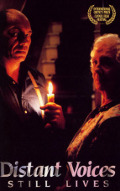
Directed by
Terence Davies
85 minutes
Rated M
Reviewed by
Bernard Hemingway


Distant Voices, Still Lives
A kind of sobering antiphon to David Lean and Noel Coward’s sentimental wartime film, This Happy Breed, Terence Davies’ remarkable Distant Voices, Still Lives portrays the lives of a Liverpuddlian working class family from the time of the same war until about 1960.
Divided into two parts which answer to the film’s title, the first part, Distant Voices, which has a strong autobiographical resonance looks at the family up to the time of the death of the father (played with harrowing conviction by Pete Postlethwaite), a man who has grown bitter and verbally and physically abusive over the years (there is no apparent reason other the grind of life itself) and effectively turned his family, particularly his chidren, against him. The second part looks at the family’s life after his death as the now grown-up children face adulthood with its joys and sorrows.
Shot two years apart there is a considerable aesthetic difference between the two parts. The first, and more successful, is sombre and quite disturbing. Like turning the pages of an album of photographs found on some abandoned dump with their enigmatic still life compositions Distant Voices progressively reveals the family's story through a masterfully economical, elliptical interplay of visual fragments, dialogue and music.
The second part of the film, Still Lives, is more conventional in form and less gruelling on the emotions, albeit losing some affective impact thereby. There is a palpable sense of relief now that the father has gone although the drab, repressive social climate of post-war England. relieved only by sing-a-longs in the pub, is still a mixture of quiet desperation and the small comforts of the mantel radio or a visit to the cinema with women only starting to stand up against bullying males. And most of the time there's the cheerless, endless rain.
The use of music which ranges from American popular song to Benjamin Britten at times suggests Dennis Potter’s black humour, a release and ironic distancing strategy which the circumstances indeed justify, but in Davies’ film music and in particular, song, is much more an integral part of the lives depicted, giving form and expression to a shared experience.
Although no exercise in dewy-eyed nostalgia Distant Voices, Still Lives is a marvellous essay in remembrance of things past.
Want something different?





